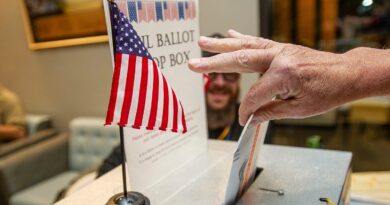Editorial: We dissect Bob Good’s conspiracy theories

Fifth District voters have elected a conspiracy theorist to Congress.
Virginia’s three Republicans who got reelected to the House — Ben Cline, Morgan Griffith and Rob Wittman — have all been conspicuously silent about the election results and President Trump’s attempt to overturn them. There will be no profiles in courage awarded there, only the silence of the lambs.
Rep.-elect Bob Good of Campbell County has shown no such reticence. He’s taken to Twitter to post a long statement that deserves some much-needed context.
Good complains about a long list of election laws that he doesn’t agree with. That’s perfectly fine. We have 50 states with 50 different rules so there’s something there for everybody to complain about, if so inclined.
First, Good objects to “millions of unsolicited mail ballots” as if that is something new. It isn’t. There has been a growing trend toward voting by mail — something the military’s been doing since the Civil War. One feature of the states that vote by mail is that they send out ballots to all registered voters. This year there were nine states that did so, plus the District of Columbia.
Now, we can have a robust debate about the merits and demerits of voting by mail, but here’s some useful context before we haul the issue into a partisan debate. Some Republicans this year came to view voting by mail as a nefarious Democratic trick, but that’s at odds with its history. At one time, it was Republicans who were pushing vote-by-mail. Oregon was the first state to experiment with voting by mail. In 1995, the Republican legislature passed a bill to allow voting-by-mail to all elections — and the Democratic governor vetoed it. Oregon voters eventually approved the measure in a referendum. We think of Colorado as a Democratic state but in the first election after Colorado adopted voting-by-mail (in 2014), Republicans scored an upset in the U.S. Senate race. Most of the states that sent out mail ballots this year are Democratic states, but one was Utah, which most definitely is not. Trump’s share of the vote grew by 13 percentage points in Utah. Voting by mail sure didn’t hurt him there.
Furthermore, of those nine states this year that sent out “unsolicited mail ballots,” eight were ones where the outcome was never in doubt. The only real swing state on the list is Nevada — where the Democratic margin, in percentage terms, actually declined slightly. Even if you take Nevada off the board, that doesn’t change the overall outcome. Therefore, those unsolicited mail ballots made no difference at all.
Good also complains about “extending voting deadlines” and “allowing the ‘correction’ of ballots after the fact.” Again, neither of these things are new, just more famous this year because so many people chose to vote absentee in some fashion. Some states did, indeed, allow mail ballots to be counted after Election Day. They treated them the way the Internal Revenue Service treats tax returns — they just had to be postmarked by the right day. Some of those deadlines were new, but many weren’t — and they weren’t always partisan either. Of the states with the latest deadlines, two were Democratic states (California and Illinois), but three were states that voted for Trump (Alaska, North Carolina and Ohio). Of the states that really made a difference in this year’s election, only one — Pennsylvania — allowed properly postmarked ballots to arrive after Election Day. So those deadlines didn’t make a difference in the outcome, either.
As for states that allow voters to correct ballots with some problem, there are 19 that do so, according to Ballotpedia. They’re a mix of Democratic and Republican states, including three of the biggest states that went for Trump — Florida, North Carolina and Ohio. Moreover, the “big three” Rust Belt states that Trump flipped in 2016 and Joe Biden flipped back in 2020 — Pennsylvania, Michigan and Wisconsin — didn’t allow that kind of “curing.” Good is simply misleading people into thinking these are the reasons why Trump lost. They’re not. Good says “the irregularities and potential for fraud are simply astounding!” The potential may be, but not the actuality — since even Republican-appointed judges have dismissed Trump’s claims and Attorney General Bill Barr says there’s no evidence that would change the outcome.
Good goes on to say “it strains credulity to believe that President Trump lost when Republicans gained so many House seats while no incumbents lost, maintained their lead in the Senate and did well in statehouse elections around the country. … It is historically difficult to defeat an incumbent president and never before has a president ‘lost’ reelection with such a stellar economic record. It simply isn’t believable that Joe Biden so significantly outperformed Barack Obama to ‘receive’ a record number of votes.”
Actually, what strains credulity is that a congressman-elect would peddle such dangerous nonsense. Working backward: Voter turnout was up, so both Biden and Trump received a record number of votes. That’s what happens when voter turnout goes up. On a percentage basis, Biden matched Obama’s 2012 reelection but not his 2008 election, so Biden didn’t outperform Obama there. Good actually recites what ought to be the main Republican talking point but completely misses its import: Biden had no coattails. If Democrats were “stealing” the election, it was a spectacularly incompetent steal. You’d think if Democrats were going to manufacture votes for Biden, they’d have given him a Democratic Senate to help him get his legislation through, and some Democratic statehouses to help gerrymander district lines for the midterms. They didn’t.
What we really saw here is that voters were tired of Trump’s antics and turned to Biden as an acceptable alternative — but that didn’t make them Democrats or mean they bought into the whole Democratic agenda. There were a significant number of Americans who voted Biden for president, and then stuck with Republicans down ballot. Good is right: Given the prepandemic economy, Trump should have won. The reason he didn’t — but other Republicans did — is that voters were tired of him personally. A normal Republican might well have won in 2020. That’s a lesson both parties might want to absorb. It will be hard for Republicans as long as there are people like Good making excuses for the crybaby-in-chief.
#pu-email-form-opinion-email { clear: both; background-color: #fff; color: #222; background-position: bottom; background-repeat: no-repeat; padding: 15px 20px; margin-bottom: 40px; box-shadow: 0px 2px 0px 0px rgba(0,0,0,.05); border-top: 4px solid rgba(0,0,0,.8); border-bottom: 1px solid rgba(0,0,0,.2); display: none; } #pu-email-form-opinion-email, #pu-email-form-opinion-email p { font-family: -apple-system, BlinkMacSystemFont, “Segoe UI”, Helvetica, Arial, sans-serif, “Apple Color Emoji”, “Segoe UI Emoji”, “Segoe UI Symbol”; } #pu-email-form-opinion-email h1 { font-size: 24px; margin: 15px 0 5px 0; font-family: “serif-ds”, Times, “Times New Roman”, serif; } #pu-email-form-opinion-email .lead { margin-bottom: 5px; } #pu-email-form-opinion-email .email-desc { font-size: 16px; line-height: 20px; margin-bottom: 5px; opacity: 0.7; } #pu-email-form-opinion-email form { padding: 10px 30px 5px 30px; } #pu-email-form-opinion-email .disclaimer { opacity: 0.5; margin-bottom: 0; line-height: 100%; } #pu-email-form-opinion-email .disclaimer a { color: #222; text-decoration: underline; } #pu-email-form-opinion-email .email-hammer { border-bottom: 3px solid #222; opacity: .5; display: inline-block; padding: 0 10px 5px 10px; margin-bottom: -5px; font-size: 16px; }
Get opinion pieces, letters and editorials sent directly to your inbox weekly!


